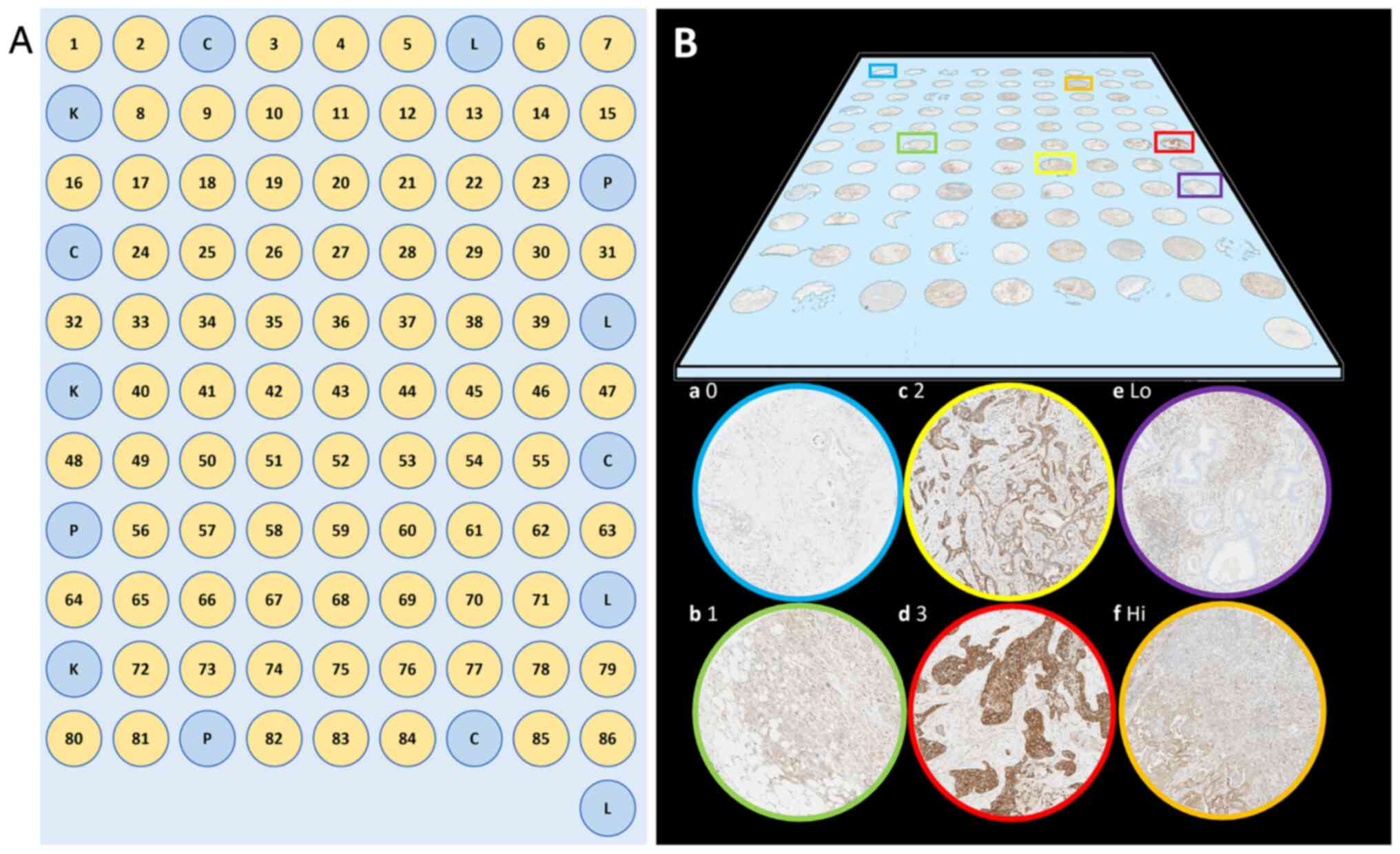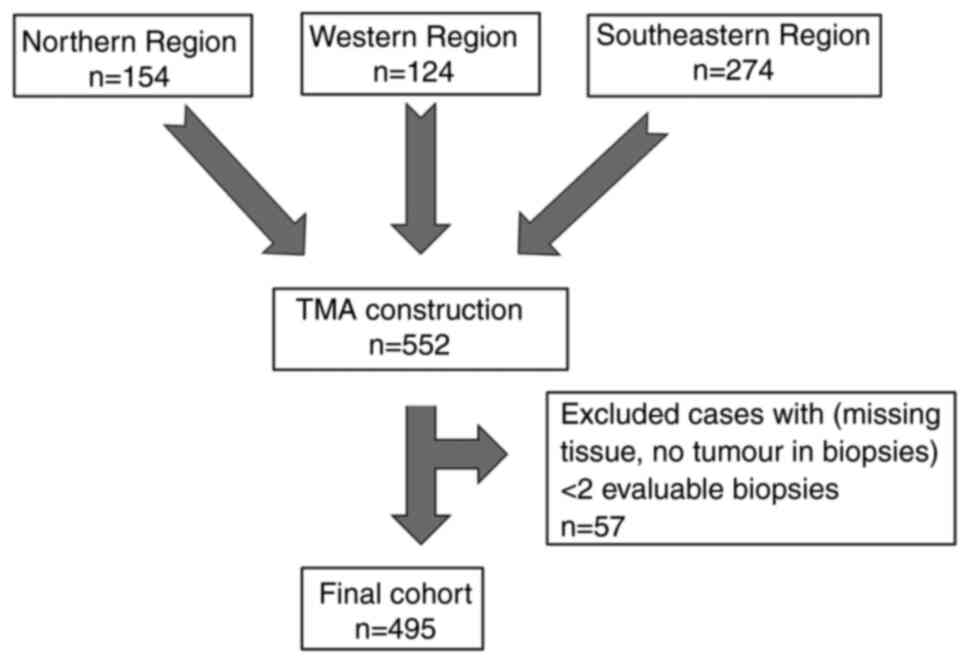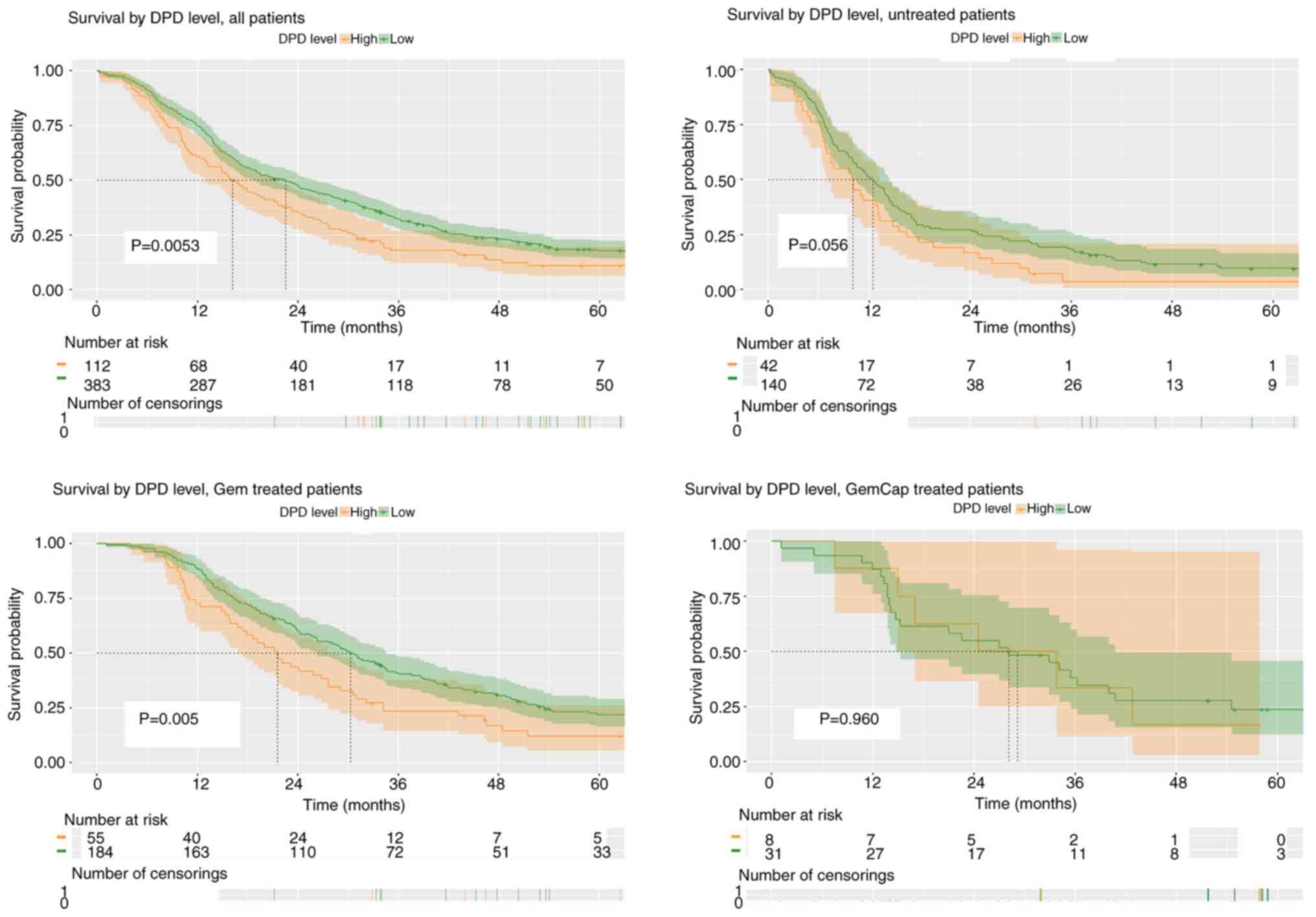|
1
|
Sung H, Ferlay J, Siegel RL, Laversanne M,
Soerjomataram I, Jemal A and Bray F: Global cancer statistics 2020:
GLOBOCAN estimates of incidence and mortality worldwide for 36
cancers in 185 countries. CA Cancer J Clin. 71:209–249. 2021.
View Article : Google Scholar : PubMed/NCBI
|
|
2
|
Cancerfonden, . The Swedish Cancer Society
Report. Cancerfonden; Stockholm: 2023
|
|
3
|
Neoptolemos JP, Stocken DD, Friess H,
Bassi C, Dunn JA, Hickey H, Beger H, Fernandez-Cruz L, Dervenis C,
Lacaine F, et al: A randomized trial of chemoradiotherapy and
chemotherapy after resection of pancreatic cancer. N Engl J Med.
350:1200–1210. 2004. View Article : Google Scholar : PubMed/NCBI
|
|
4
|
Neoptolemos JP, Stocken DD, Bassi C,
Ghaneh P, Cunningham D, Goldstein D, Padbury R, Moore MJ, Gallinger
S, Mariette C, et al: Adjuvant chemotherapy with fluorouracil plus
folinic acid vs. gemcitabine following pancreatic cancer resection:
A randomized controlled trial. JAMA. 304:1073–1081. 2010.
View Article : Google Scholar : PubMed/NCBI
|
|
5
|
Neoptolemos JP, Palmer DH, Ghaneh P,
Psarelli EE, Valle JW, Halloran CM, Faluyi O, O'Reilly DA,
Cunningham D, Wadsley J, et al: Comparison of adjuvant gemcitabine
and capecitabine with gemcitabine monotherapy in patients with
resected pancreatic cancer (ESPAC-4): A multicentre, open-label,
randomised, phase 3 trial. Lancet. 389:1011–1024. 2017. View Article : Google Scholar : PubMed/NCBI
|
|
6
|
Conroy T, Hammel P, Hebbar M, Ben
Abdelghani M, Wei AC, Raoul JL, Choné L, Francois E, Artru P, Biagi
JJ, et al: FOLFIRINOX or gemcitabine as adjuvant therapy for
pancreatic cancer. N Engl J Med. 379:2395–2406. 2018. View Article : Google Scholar : PubMed/NCBI
|
|
7
|
Uesaka K, Boku DN, Fukutomi A, Okamura Y,
Konishi M, Matsumoto I, Kaneoka Y, Shimizu Y, Nakamori S, Sakamoto
H, et al: Adjuvant chemotherapy of S-1 versus gemcitabine for
resected pancreatic cancer: A phase 3, open-label, randomised,
non-inferiority trial (JASPAC 01). Lancet. 388:248–257. 2016.
View Article : Google Scholar : PubMed/NCBI
|
|
8
|
Padmanabhan S: Handbook of
pharmacogenomics and stratified medicine. Academic Press;
Cambridge, MA, USA: pp. 341–364. 2014
|
|
9
|
Longley DB, Harkin DP and Johnston PG:
5-fluorouracil: Mechanisms of action and clinical strategies. Nat
Rev Cancer. 3:330–338. 2003. View
Article : Google Scholar : PubMed/NCBI
|
|
10
|
Fukui Y, Oka T, Nagayama S, Danenberg PV,
Danenberg KD and Fukushima M: Thymidylate synthase,
dihydropyrimidine dehydrogenase, orotate phosphoribosyltransferase
mRNA and protein expression levels in solid tumors in large scale
population analysis. Int J Mol Med. 22:709–716. 2008.PubMed/NCBI
|
|
11
|
European Medicines Agency, . EMA
recommendations on DPD testing prior to treatment with
fluorouracil, capecitabine, tegafur and flucytosine. EMA, Press
Release; Amsterdam: 2020
|
|
12
|
Falvella FS, Cheli S, Martinetti A,
Mazzali C, Iacovelli R, Maggi C, Gariboldi M, Pierotti MA, Di
Bartolomeo M, Sottotetti E, et al: DPD and UGT1A1 deficiency in
colorectal cancer patients receiving triplet chemotherapy with
fluoropyrimidines, oxaliplatin and irinotecan. Br J Clin Pharmacol.
80:581–588. 2015. View Article : Google Scholar : PubMed/NCBI
|
|
13
|
Zhang YH, Shi WN, Wu SH, Miao RR, Sun SY,
Luo DD, Wan SB, Guo ZK, Wang WY, Yu XF, et al: SphK2 confers
5-fluorouracil resistance to colorectal cancer via upregulating
H3K56ac-mediated DPD expression. Oncogene. 39:5214–5227. 2020.
View Article : Google Scholar : PubMed/NCBI
|
|
14
|
Vallböhmer D, Yang DY, Kuramochi H,
Shimizu D, Danenberg KD, Lindebjerg J, Nielsen JN, Jakobsen A and
Danenberg PV: DPD is a molecular determinant of capecitabine
efficacy in colorectal cancer. Int J Oncol. 31:413–418.
2007.PubMed/NCBI
|
|
15
|
Elander NO, Aughton K, Ghaneh P,
Neoptolemos JP, Palmer DH, Cox TF, Campbell F, Costello E, Halloran
CM, Mackey JR, et al: Expression of dihydropyrimidine dehydrogenase
(DPD) and hENT1 predicts survival in pancreatic cancer. Br J
Cancer. 118:947–954. 2018. View Article : Google Scholar : PubMed/NCBI
|
|
16
|
Kondo N, Murakami Y, Uemura K, Sudo T,
Hashimoto Y, Nakashima A and Sueda T: Combined analysis of
dihydropyrimidine dehydrogenase and human equilibrative nucleoside
transporter 1 expression predicts survival of pancreatic carcinoma
patients treated with adjuvant gemcitabine plus S-1 chemotherapy
after surgical resection. Ann Surg Oncol. 19 (Suppl 3):S646–S655.
2012. View Article : Google Scholar : PubMed/NCBI
|
|
17
|
Kuramochi H, Hayashi K, Uchida K, Nakajima
G, Hatori T, Danenber KD, Danenberg PV and Yamamoto M: High
intratumoral dihydropyrimidine dehydrogenase mRNA levels in
pancreatic cancer associated with a high rate of response to S-1.
Cancer Chemother Pharmacol. 63:85–89. 2008. View Article : Google Scholar : PubMed/NCBI
|
|
18
|
Tsukahara S, Shiota M, Takamatsu D,
Nagakawa S, Matsumoto T, Kiyokoba R, Yagi M, Setoyama D, Noda N,
Matsumoto S, et al: Cancer genomic profiling identified
dihydropyrimidine dehydrogenase deficiency in bladder cancer
promotes sensitivity to gemcitabine. Sci Rep. 12:85352022.
View Article : Google Scholar : PubMed/NCBI
|
|
19
|
Blomstrand H, Olsson H, Green H, Björnsson
B and Elander NO: Impact of resection margins and para-aortic lymph
node metastases on recurrence patterns and prognosis in resectable
pancreatic cancer-a long-term population-based cohort study. HPB
(Oxford). 25:1531–1544. 2023. View Article : Google Scholar : PubMed/NCBI
|
|
20
|
Schemper M and Smith TL: A note on
quantifying follow-up in studies of failure time. Control Clin
Trials. 17:343–346. 1996. View Article : Google Scholar : PubMed/NCBI
|
|
21
|
Tempero M, Pelzer U, O'Reilly EM, Winter
J, Oh DY, Li CP, Tortora G, Chang HM, Lopez CD, Bekaii-Saab T, et
al: Adjuvant nab-paclitaxel + gemcitabine in resected pancreatic
ductal adenocarcinoma: Results from a randomized, open-label, phase
III trial. J Clin Oncol. 41:2007–2019. 2023. View Article : Google Scholar : PubMed/NCBI
|
|
22
|
Miyake K, Imura S, Yoshizumi T, Ikemoto T,
Morine Y and Shimada M: Role of thymidine phosphorylase and orotate
phosphoribosyltransferase mRNA expression and its ratio to
dihydropyrimidine dehydrogenase in the prognosis and
clinicopathological features of patients with pancreatic cancer.
Int J Clin Oncol. 12:111–119. 2007. View Article : Google Scholar : PubMed/NCBI
|
|
23
|
Oba A, Ban D, Kirimura S, Akahoshi K,
Mitsunori Y, Matsumura S, Ochiai T, Kudo A, Tanaka S and Minoru T:
Clinical application of the biomarkers for the selection of
adjuvant chemotherapy in pancreatic ductal adenocarcinoma. J
Hepatobiliary Pancreat Sci. 23:480–488. 2016. View Article : Google Scholar : PubMed/NCBI
|
|
24
|
Aughton K, Elander NO, Evans A, Jackson R,
Campbell F, Costello E, Halloran CM, Mackey JR, Scarfe AG, Valle
JW, et al: hENT1 predicts benefit from gemcitabine in pancreatic
cancer but only with low CDA mRNA. Cancers (Basel). 13:57582021.
View Article : Google Scholar : PubMed/NCBI
|
|
25
|
Wei CH, Gorgan TR, Elashoff DA, Hines OJ,
Farrell JJ and Donahue TR: A meta-analysis of gemcitabine
biomarkers in patients with pancreaticobiliary cancers. Pancreas.
42:1303–1310. 2013. View Article : Google Scholar : PubMed/NCBI
|

















